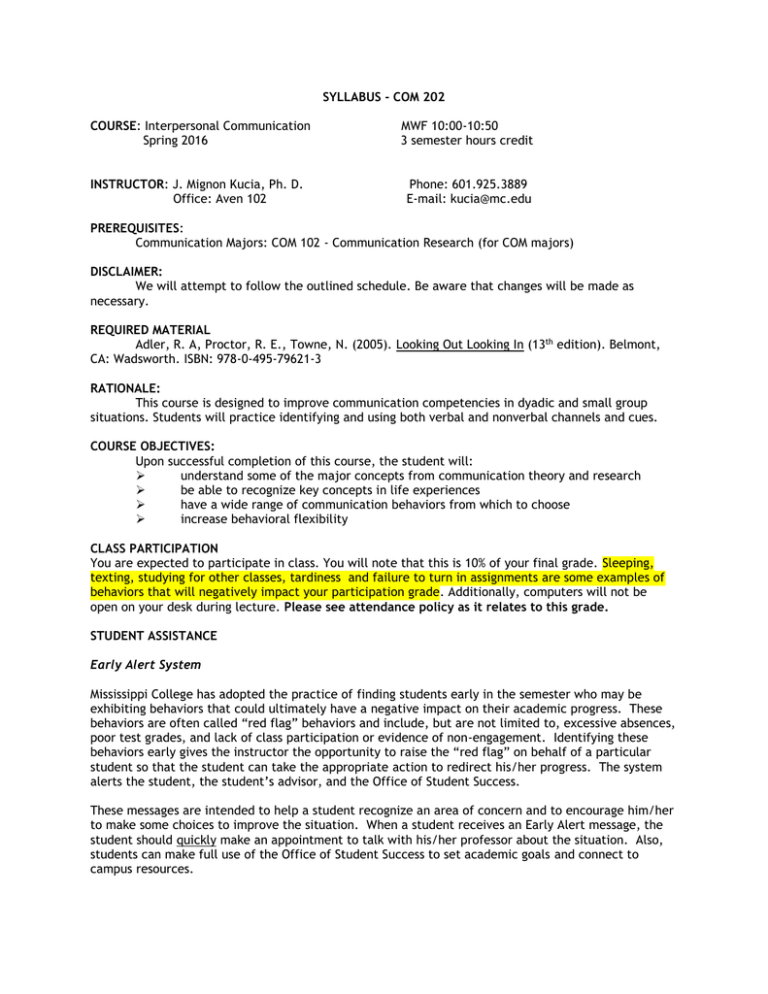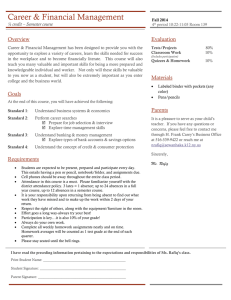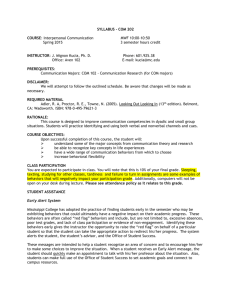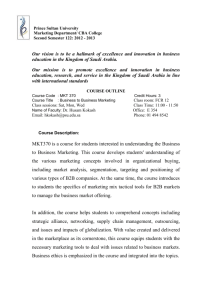SYLLABUS - COM 202 COURSE INSTRUCTOR
advertisement

SYLLABUS - COM 202 COURSE: Interpersonal Communication Spring 2016 MWF 10:00-10:50 3 semester hours credit INSTRUCTOR: J. Mignon Kucia, Ph. D. Office: Aven 102 Phone: 601.925.3889 E-mail: kucia@mc.edu PREREQUISITES: Communication Majors: COM 102 - Communication Research (for COM majors) DISCLAIMER: We will attempt to follow the outlined schedule. Be aware that changes will be made as necessary. REQUIRED MATERIAL Adler, R. A, Proctor, R. E., Towne, N. (2005). Looking Out Looking In (13th edition). Belmont, CA: Wadsworth. ISBN: 978-0-495-79621-3 RATIONALE: This course is designed to improve communication competencies in dyadic and small group situations. Students will practice identifying and using both verbal and nonverbal channels and cues. COURSE OBJECTIVES: Upon successful completion of this course, the student will: understand some of the major concepts from communication theory and research be able to recognize key concepts in life experiences have a wide range of communication behaviors from which to choose increase behavioral flexibility CLASS PARTICIPATION You are expected to participate in class. You will note that this is 10% of your final grade. Sleeping, texting, studying for other classes, tardiness and failure to turn in assignments are some examples of behaviors that will negatively impact your participation grade. Additionally, computers will not be open on your desk during lecture. Please see attendance policy as it relates to this grade. STUDENT ASSISTANCE Early Alert System Mississippi College has adopted the practice of finding students early in the semester who may be exhibiting behaviors that could ultimately have a negative impact on their academic progress. These behaviors are often called “red flag” behaviors and include, but are not limited to, excessive absences, poor test grades, and lack of class participation or evidence of non-engagement. Identifying these behaviors early gives the instructor the opportunity to raise the “red flag” on behalf of a particular student so that the student can take the appropriate action to redirect his/her progress. The system alerts the student, the student’s advisor, and the Office of Student Success. These messages are intended to help a student recognize an area of concern and to encourage him/her to make some choices to improve the situation. When a student receives an Early Alert message, the student should quickly make an appointment to talk with his/her professor about the situation. Also, students can make full use of the Office of Student Success to set academic goals and connect to campus resources. Students with Disabilities In order for a student to receive disability accommodations under Section 504 of the Americans with Disabilities Act, he or she must schedule an individual meeting with the Director of Student Counseling Services immediately upon recognition of their disability (if their disability is known they must come in before the semester begins or make an appointment immediately upon receipt of their syllabi for the new semester). The student must bring with them written documentation from a medical physician and/or licensed clinician that verifies their disability. If the student has received prior accommodations, they must bring written documentation of those accommodations (example Individualized Education Plan from the school system). Documentation must be current (within 3 years). The student must meet with SCS face-to face and also attend two (2) additional follow up meetings (one mid semester before or after midterm examinations and the last one at the end of the semester). Please note that the student may also schedule additional meetings as needed for support through SCS as they work with their professor throughout the semester. Note: Students must come in each semester to complete their Individualized Accommodation Plan (example: MC student completes fall semester IAP plan and even if student is a continuing student for the spring semester they must come in again to complete their spring semester IAP plan). Student Counseling Services is located on the 4th floor of Alumni Hall) or they may be contacted via email at mbryant@mc.edu . You may also reach them by phone at 601-925-7790. Dr. Morgan Bryant is director of MC Student Counseling Services. COURSE POLICIES: Evaluation Your work in this course will be grades on the following scale: A = 94-100 Exceptional work B = 85-93 Above average work C = 78-84 Average work D = 70-77 Below average work F = below 70 Failing work You will be evaluated on the following: Service Learning Class Participation Research Paper/Presentation Homework/assignments Exam 1 Exam 2 Exam 3 (final) 15% 10% 15% 10% 15% 15% 20% 100% WRITTEN ASSIGNMENTS: You will have several written assignments in this class. I will grade your written projects on style as well as content. Assignments should be prepared in accordance with the guidelines set forth in the Publication Manual of the American Psychological Association. Academic Integrity: Mississippi College students are expected to be honest. The college and this instructor does not tolerate, cheating, plagiarism, forgery or misuse of college documents. The penalty may include, loss of credit and possible dismissal from the college. The policy is stated in the Mississippi College Tomahawk and in Policy 2.19. Copies of the policy are available on the Mississippi College Web. Attendance It is in your best interest to be here. Much of what will be on tests includes material from class meetings. I will adhere strictly to the university policy on absenteeism which requires that you be present for 75% of the class meetings. This means that if you miss more than 12 classes in a MWF, or more than 8 classes in a MW or TR class, you will be assigned an automatic “F”. If you are absent, it is your responsibility to get the material you missed from another class member. As noted previously, participation accounts for 10% of your final grade. Other than the noted activities which can affect your participation grade, absences will also have an impact on this grade. You will be allowed 3 absences with no penalty. After those 3 absences, you will lose points on the participation grade. For a MW or TR class, the penalty will be 3 points, per absence over 3, and for a MWF class there will be a 2 point reduction in your participation grade for each absence over 3. In classes such as these, much of the learning is a result of the interaction and activities which take place during class, therefore it is imperative that you be in attendance was much as possible. MAKE-UP WORK: Presentations Students with unexcused absences will not be allowed to make up presentations. Students with an excused absence will be allowed to n=make up a presentation at my earliest convenience. This means you should be prepared to present until you have the opportunity. Papers, Daily Grades and Quizzes Papers, class activities and assignment will be penalized 10 points for every class day they are late. Nothing will be accepted more than one week after its due date. Quizzes may not be made up. Exams Students with excused absence may make up and exam in one week. Students with an unexcused absence will not be allowed to make up an exam. INSTRUCTIONAL PROCEDURES AND TECHNIQUES: Lecture Readings Quizzes Projects Exams Class Activities Class Discussion Research Paper Presentations TENTATIVE SCHEDULE 1 1/11-15 Introductions and Course Overview Shoe Box Speeches 2 1/18 1/19-22 MLK Holiday Chapter 1 - Intro. To Interpersonal Communication 3 1/25-29 Chapter 1 - Intro. To Interpersonal Communication Chapter 2 -Communication and Identity Shield Presentations 4 2/1-5 Chapter 2 -Communication and Identity Test Chapters 1-2 5 2/8-12 Chapter 3 - Perception 6 2/15-19 Chapter 4 - Emotions 7 2/22-26 Chapter 5 – Language 8 2/29-3/4 Test Chapters 3-5 Chapter 8 - Relational Dynamics Discuss Research Paper 9 3/4-13 SPRING BREAK 10 3/14-18 Chapter 8 - Relational Dynamics 11 3/21-25 Chapter 6 - Nonverbal Messages Nonverbal Faux Pas Presentations 12 3/28 3/30-4/4 EASTER HOLIDAY Chapter 6 - Nonverbal Messages Research Paper Due Research Paper Presentations 13 4/11-15 Chapter 7 - Listening 14 4/18-22 Chapter 7 - Listening Chapter 11 - Managing Interpersonal Conflicts 15 4/25-27 Service Learning Reports and Presentations Due Review & Make Up Days Please read the following statements and initial in the blanks provided. After you have read and initialed the statements, please sign and date the bottom of the list. COM 202 will require the following assignments and behaviors: ______ One research paper on a topic to be chosen by me and approved by Dr. Kucia. I understand that this must be an original work with at least 5 pages of text and that any ideas, phrases, etc. MUST be cited to prevent plagiarism (which is grounds for a 0 on the assignment). This paper will be written in APA 6th Style and will follow those guidelines. I understand that The Writing Center on campus can help me with the paper if needed. _____ A service learning project which will require that I work for 10 hours in a service capacity approved by, and administered through, the MC Service Learning Center. This will include writing and presenting a two-page refection paper. _____ I understand that texting in class (and getting caught, of course) will result in a 10-point deduction in my participation grade – essentially 1 point off my final average. _____ I understand that attendance will be taken and I have read and understand the attendance policy as stated in the syllabus Signed ___________________ Name ___________________Date What is a phone number with which I could reach you in a class-related situation if necessary ________________ Is there anything that I need to know about your current life/school/work situations that would allow me to help/understand you better?



